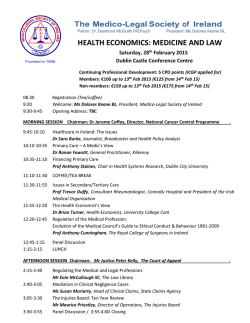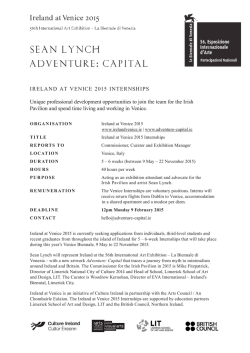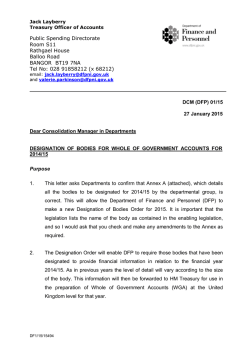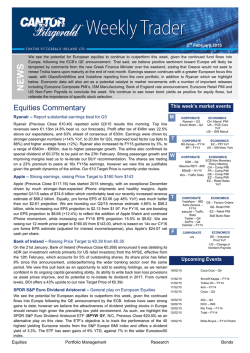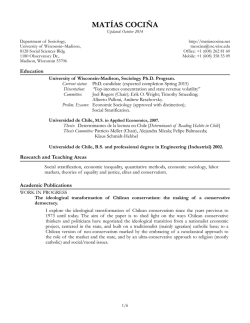
Textile Accounts of Conflicts
Dia de Visita / Day of Visit Victoria Diaz Caro, 1988 Photo Martin Melaugh Oshima Hakko Museum collection, Japan Textile Accounts of Conflicts Linen Hall Library, Belfast January - March 2015 #accountsNI TEXTILE ACCOUNTS OF CONFLICTS An exhibition of textiles and associated memorabilia commissioned by the International Conflict Research Institute (INCORE), Ulster University, for the International Conference Accounts of the Conflict which took place in Belfast 17 & 18 November 2014. Bringing it now to the Linen Hall Library will allow exposure to an ample number of people and voice publically what the makers and sewers have endured and shared. In this exhibition, the first hand testimony of the destructive and multi-layered impact of conflict and human rights abuse, is narrated in textile form and is accompanied by associated memorabilia. “War textiles are born from this urge to find a new language with which to tell a story”1. quilts, wall hangings, memory cloths and story cloths is drawn from Northern Ireland, England, Spain, Chile, Peru, Argentina, Afghanistan, Palestine, Zimbabwe, South Africa, Germany, Brazil, Canada and Colombia. Using mostly only the humble needle, thread and scraps of fabric, women worked individually or in groups, often in a clandestine manner at odd hours, in their burning quest to present to the world their experiences of conflict. Their finished pieces bring to life stories of disappearances, execution, torture, resistance, denouncement, displacement, forced exile and loss of their loved ones. In the midst of that, solidarity, resistance, resilience and return emerge. The powerful and in-depth way in which arpilleras (and by extension other textiles and associated memorabilia) facilitate the uncovering of these narratives. The memorabilia which form part of this exhibition are at first glance ordinary everyday objects, yet the stories they embody; the tangible, tactile memories they store in the folds of the people who wore them or used them in time of war, conflict, or human rights violations, transform them into extraordinary objects. The keeping, safeguarding and bequeathing of these objects of witness is a reminder of the stories that refuse to be silenced and forgotten. This collection of arpilleras (three dimensional textiles from Latin America, which originated in Chile), Textile Accounts of Conflicts, in bringing forth what cannot be told in words, allows these women to articulate their own story, engage with and challenge you, the viewer, to reflect on their chilling testimonies and perhaps be prompted to take action. Retorno de los exiliados / Return of the exiles Chilean arpillera, Victoria Diaz Caro, 1992, Photo Martin Melaugh Kinderhilfe arpillera collection, Chile/Bonn Roberta Bacic & Breege Doherty, February 2015 www.cain.ulst.ac.uk/quilts We would like to thank the Psychology Research Institute at Ulster University for supporting this exhibition. Cooke & MacDowell, Weavings of War, Fabrics of Memories, 2005 1 List of textiles and other associated memorabilia Memorabilia are objects kept or collected because of their associations with memorable people or events. In this exhibition, the idea of incorporating them emerged as they have story to tell in themselves; they carry tangible, body contact, tactile memories of the people who wore them or used them in time of war, conflict, or human rights violations and they bear witness to that experience. The keeping, safeguarding and bequeathing of these ordinary, yet extraordinary objects, is in itself a reminder of the stories that refuse to be silenced and forgotten. Pañoleta / Headscarf Worn on the weekly Thursday march, by an Abuela de Plaza de Mayo / Grandmother of Plaza de Mayo, to make visible the detention and disappearance on the 12th April 1977 of her son, Carlos Maria Riggerone, his partner Monica Susana Masri and their child, born in captivity in Argentina. Roberta Bacic collection Cinta conmemorativa / symbolic ribbon Carried by an Abuela de Plaza de Mayo, during a Thursday march to denounce the detention and disappearance of Chilean Carmen Delard on the 10th January 1977 in Argentina. Roberta Bacic collection, Donation from Victoria Cáceres, Chile Retorno / Return Colombian arpillera, Mujeres tejiendo sueños y sabores de paz, Mampuján, 2013 Photo Martin Melaugh “Kalashenkoof”. Afghan rug made by UNCR refugees from post Soviet civil war, near Peshawar, Pakistan, circa 1995. The AK-74 depicted is the third generation in the family of firearms designed by Soviet weapons engineer Mikhail Kalashnikov and is a common motif used by carpet makers. The rifle and its variants have been used by many Soviet and later Russian troops since 1974. Colin Peck collection, Northern Ireland Ônde estão nossos direitos? / Where are our rights? Brazilian arpillera, Women of the Movement of People Affected by Dams (MAB), 2013 Photo Martin Melaugh Courtesy Movimiento de los Afectados por Represas (MAB) Table napkin Used as a table cloth by Eva Herzfeld & Vinko Bacic, 1945/1948, during their stay at a refugee camp in Naples and en route on a ship carrying Red Cross refugees from Europe to Argentina and Chile after World War II. Roberta Bacic collection, Northern Ireland Towel Used by Nelson Mandela in his personal office bathroom, c2008-2010. Courtesy of Verne Harris, Director of Research and Archive at the Nelson Mandela Foundation, South Africa Photograph Some of the 132 Jewish children who were rescued from Terezin concentration camp, Czech Republic; around 15,000 perished. In this image they are playing in the park of Castle Olesovice. War Resisters International photo archive List of arpilleras, quilts and other textiles Common loss: 3000+ dead between 1969 and 1994 Northern Ireland four panel wall hanging by Irene MacWilliam, 1996 Irene MacWilliam collection, Northern Ireland Quilt of Remembrance Northern Ireland quilt by WAVE trauma centre participants, 2010 - 2013 Courtesy of WAVE trauma centre No going back Northern Ireland arpillera by Sonia Copeland, 2009 Courtesy of the artist The Side of the Wall Northern Ireland arpillera by Michele Connor, Fab Femmes, Ballymoney, 2013 Causeway Museum Service collection, Northern Ireland In Times of Trouble Northern Ireland arpillera by Imelda Purcell, Focus on Families, Ballysally, Coleraine, 2013 Causeway Museum Service collection, Northern Ireland Ballykelly Bombing Arpillera by Justene Archer, Focus on Families, Ballysally, Coleraine, 2013 Causeway Museum Service collection, Northern Ireland Auf der Flucht 1945 / Fleeing in 1945 German arpillera by Mara Loytved-Hardegg, 2010 Roberta Bacic collection, Northern Ireland Retorno de los exiliados / Return of the exiles Chilean arpillera, Victoria Diaz Caro, 1992, Photo Martin Melaugh Kinderhilfe arpillera collection, Chile/Bonn Retorno / Return Colombian arpillera, Mujeres tejiendo sueños y sabores de paz, Mampuján, 2013 Roberta Bacic collection, Northern Ireland NO MAS / No more Colombian arpillera, Mujeres tejiendo sueños y sabores de paz, Mampuján, 2013 Roberta Bacic collection, Northern Ireland They burned our homes Zimbabwean arpillera, 2012 Collective work facilitated by Shari Eppel Solidarity Peace Trust Zimbabwe, Killarney Girls collection, Zimbabwe Memory Cloth Hand embroidered remembrance inscriptions on cloth by ex-residents of District Six, c1998 Courtesy of Tina Smith, Head of Exhibition District Six Museum, Cape Town, South Africa El recuerdo de esta historia / The memory of this story Spanish arpillera by Ángela Matamoros Vázquez and Ángela Vázquez González Women Sewing History Workshop, Badalona, Spain, 2009 Fundiació Ateneu Sant Roc collection, Spain Mis memorias de la Guerra / My memories of the war Spanish arpillera by Rosalía Rodríguez Hernández, Women Sewing History Workshop, Badalona, Spain, 2009 Fundiació Ateneu Sant Roc collection, Spain Exilio de los Republicanos cruzando los Pirineos / Exile of the Republicans crossing the Pyrenees Catalonian/Spanish arpillera by arpilleristas Fundació Ateneu Sant Roc, 2012 Fundiació Ateneu Sant Roc collection, Spain Ônde estão nossos direitos? / Where are our rights? Brazilian arpillera, Women of the Movement of People Affected by Dams (MAB), 2013 Courtesy Movimiento de los Afectados por Represas (MAB) When Silence is Broken Canadian arpillera, anon, 2009 Courtesy of Lynne Jenkins, Barbra Schlifer Commemorative Clinic, Toronto ¿Dónde están / Where are they? Chilean arpillera, anon, early 1980s Theresa Wolfwood collection, Victoria, Canada Irene, Marta, Hilda, Patricia: Ahora y Siempre Presentes / Irene, Marta, Hilda, Patricia: Now and Always Present Argentinean arpillera by students from Escuela de Cerámica, 2013 Roberta Bacic collection, Northern Ireland Amandla! South African Story Cloth by Elaine Barnard, 2013-2014 Michigan State University Museum collection. Libertad a los presos politicos / Freedom for the political prisoners Chilean arpillera, anon, 1985c Kinderhilfe arpillera collection, Chile/Bonn Dia de Visita / Day of Visit Chilean arpillera, Victoria, Diaz Caro, 1988 Oshima Hakko Museum collection, Japan Gegossenes Blei / Cast lead German wall hanging, Heidi Drahota, 2009 Heidi Drahota collection, Germany The Arch of Jerusalem Palestinian wall hanging, designed by Siham AbuGhazaleh, embroidered by Ribhiyeh Baliut, 2014 Palestinian Culture Centre collection Rescate de niños judíos / Rescue of Jewish Children Argentinean arpillera, Ana Zlatkes, 2011 Ana Zlates collection, Argentina Reflections on violence English arpillera by Linda Adams, 2009 Courtesy of Linda Adams, England Violencia en Ayacucho / Violence in Ayacucho Peruvian arpillera, FCH Mujeres Creativas workshop, 1985 Replica, 2009 Roberta Bacic collection, Donation from Rebecca Dudley, USA/Northern Ireland La Cueca Sola / Dancing Cueca alone Chilean arpillera, Gala Torres, 1989 Oshima Hakko Museum collection, Japan En Chile se tortura / Demonstration against torture Chilean arpillera by Violeta Morales, 1988 Oshima Hakko Museum collection, Japan Sala de torturas / Torture Chamber Chilean arpillera by Violeta Morales, 1996 Marjorie Agosín collection, Chile / USA Gegossenes Blei / Cast lead German wall hanging, Heidi Drahota, 2009 Photo Claus Sperr Heidi Drahota collection, Germany INCORE established in 1993 is a centre of excellence and the premier research institute in conflict transformation on the island of Ireland, and an associated site of the United Nations University. INCORE’s vision is of a world where divided societies are transformed from conflict to sustainable peace. • INCORE’s research focuses on deepening knowledge about peacemaking and peacebuilding processes. • INCORE builds the capacity of local and international researchers, policymakers and practitioners to tackle the complex challenge of moving from violence. • INCORE hosts an MSc in Applied Peace and Conflict Studies, as well as a stream on young children and conflict in partnership with the NGO Early Years. • The annual INCORE International Summer School, now in its 15th year, provides an advanced learning opportunity on peacebuilding. • CAIN is based at INCORE, and is the largest online archive of conflictrelated material on Northern Ireland in the world. • INCORE hosts ARK which makes social science research on Northern Ireland available to the public. “ QUICK FACTS • 40 major projects undertaken • 25 years of teaching peace and conflict studies • 400 masters graduates from 25 countries • 700 delegates from 40 countries at summer schools • 50 local-global exchanges • Hosted peace lectures by Kofi Annan, The Dalai Lama, Bill Clinton, Mary McAleese, Hillary Rodham Clinton, John Hume and others • 17 million website visits to CAIN in 10 years, 50,000 unique visits a month • 2 million website visits to INCORE and ARK ...thrilled by all the work that INCORE has done and I hope you will do more of it. Train a new generation of leaders... ” (President Bill Clinton, Public Address, Guildhall Square, Derry, 5 March 2014) INCORE Ulster University Aberfoyle House, Northland Road Derry~Londonderry BT48 7JA T: +44 (0)28 7167 5500, F: +44 (0)28 7167 5510 [email protected], @INCOREinfo, www.ulster.ac.uk/incore List of Events Holocaust Memorial Day Documentary: Through the Eye of the Needle Workshops: How to make an Arpillera Doll Tuesday 27 January 2015, 1.00pm Friday 13 February and Saturday 7 March at 2.00pm Free Screening Free Workshops This inspiring 30-minute award-winning documentary examines the life of Esther Nisenthal Krinitz – how she survived the Holocaust as a teenager and how she came to tell her life story in a series of 36 fabric collage and embroidered panels. Arpilleras are a textile applique technique with a long history of political resistance. Join Textile Accounts of Conflicts contributor and curator Roberta Bacic, and learn more about the history of arpilleras through a workshop on how to make your own arpillera doll. Please feel free to bring scraps of material with you of personal significance to incorporate into your doll. No sewing skills are required. Film directed by Nina Shapiro-Perl Produced by Art and Remembrance http://artandremembrance.org/ Textile Accounts of Conflicts Exhibition 6 February – 7 March Free Exhibition Women from all over the world bring us first hand testimony in textile form of their experience of conflict. Using needle, thread and scraps of fabric, they recount in chilling detail the destructive and multi-layered impact of conflict on their lives. This collection of arpilleras (three dimensional textiles from Latin America, which originated in Chile), quilts, wall hangings, memory cloths and story cloths is drawn from Northern Ireland, England, Spain, Chile, Peru, Argentina, Afghanistan, Palestine, Zimbabwe, South Africa, Germany, Brazil, Canada and Colombia. Curated by Roberta Bacic assisted by Breege Doherty for Accounts of the Conflict conference held in Belfast 17/18 November 2014 organized by INCORE, Ulster University. Exhibition Launch Friday 6 February 2015 at 1.00pm in the Performance Area, Linen Hall Library, Belfast Speakers include: Professor Gillian Robinson, INCORE International Conflict Research Institute, Ulster University and Valerie Wilson, Curator of Textiles National Museums Northern Ireland. Troubles Textiles, with Dr Karen Nickell Saturday 7 March at 12.00noon Free Event This illustrated talk will explore a unique response by women to the Troubles – the use of cloth and stitch as creative expression, storytelling, testimony, protest and memory.
© Copyright 2026
